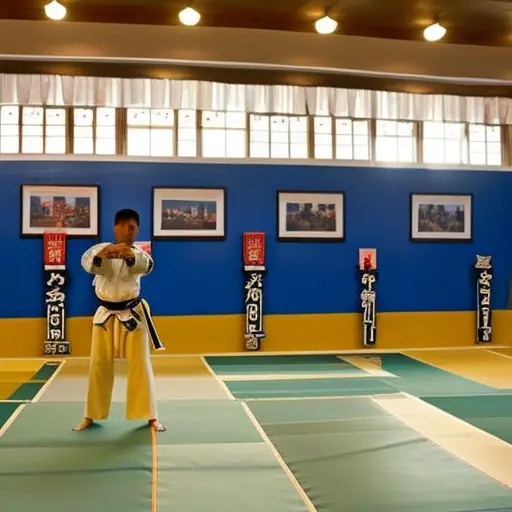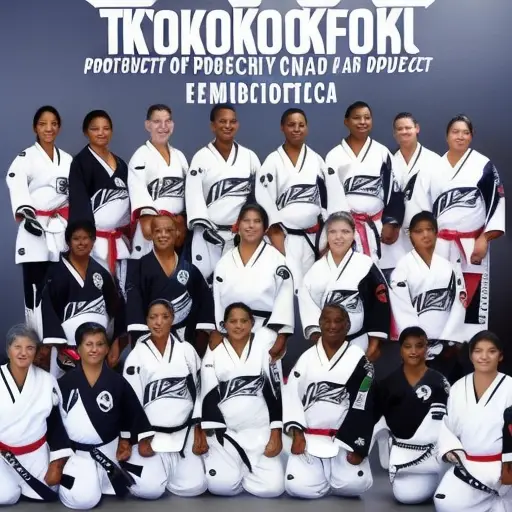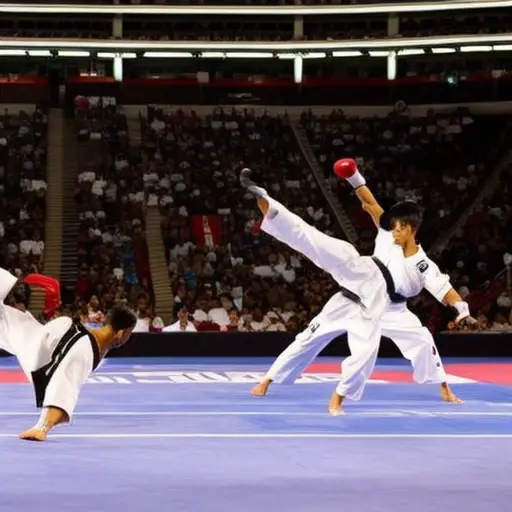Meet the Pioneers: Interviews With Taekwondo Masters

Discover the untold stories of taekwondo’s trailblazers in ‘Meet the Pioneers: Interviews With Taekwondo Masters.’
This captivating article dives deep into the lives and experiences of these esteemed martial arts practitioners, shedding light on their early years, unveiling the secrets behind mastering taekwondo techniques, and exploring the profound philosophy that underpins their practice.
As we delve into their triumphs, challenges, and enduring legacies, join us on a journey that celebrates the evolution and impact of taekwondo through the eyes of its revered masters.
The Early Years: an Insight Into Their Taekwondo Journey
During their formative years, these taekwondo masters embarked on a transformative journey that laid the foundation for their future success in the martial art. Their early training played a crucial role in shaping their skills and character, while their influential mentors provided guidance and inspiration along the way.
Early training for these taekwondo masters began at a young age. They were introduced to the art form through structured classes that focused on building a strong foundation in the basic techniques, such as kicks, punches, and blocks. These early training sessions emphasized discipline, respect, and perseverance, instilling in them the values that would guide them throughout their taekwondo journey.
In addition to their training, these taekwondo masters had influential mentors who played a significant role in their development. These mentors were experienced and highly skilled practitioners who provided guidance, support, and valuable insights. Through one-on-one instruction, the mentors helped refine their techniques, honed their skills, and imparted their wisdom about the philosophy and principles of taekwondo.
The combination of early training and influential mentors created a solid foundation for these taekwondo masters. It not only shaped their physical abilities but also instilled in them the mental strength and determination needed to excel in the martial art. The lessons learned during their formative years would serve as the stepping stones to their future success and achievements in the world of taekwondo.
Unveiling the Secrets: Mastering Taekwondo Techniques
To truly master taekwondo techniques, it is essential to understand and practice the precise movements, combinations, and strategies that make this martial art so unique. Mastering taekwondo forms is a key aspect of training, as these forms, or patterns, are a series of movements that simulate real combat situations. By practicing these forms repeatedly, taekwondo practitioners develop muscle memory and fluidity in their movements, allowing them to execute techniques with precision and speed.
Effective training methods in taekwondo focus on developing strength, flexibility, and agility. Conditioning exercises such as running, jumping rope, and weightlifting help improve overall physical fitness, while specific drills target the development of speed and power. Sparring and self-defense training allow practitioners to apply their techniques in realistic situations, honing their reflexes and decision-making skills.
In addition to physical training, mental discipline is also crucial in mastering taekwondo techniques. Concentration, focus, and perseverance are emphasized throughout the training process, enabling practitioners to maintain composure and execute techniques with accuracy even in high-pressure situations.
Transitioning into the subsequent section about ‘the philosophy of taekwondo: wisdom from the masters’, it is important to note that the mastery of taekwondo techniques is only one aspect of this martial art. The philosophy behind taekwondo is deeply rooted in self-discipline, respect, and the pursuit of personal growth.
The Philosophy of Taekwondo: Wisdom From the Masters
The philosophy of Taekwondo is deeply rooted in its core principles. These principles emphasize the mastery of both the mind and body. Taekwondo masters impart their wisdom by teaching practitioners the importance of discipline, respect, perseverance, and self-control.
Core Principles of Taekwondo
Exploring the foundational tenets of Taekwondo, practitioners gain valuable insights from the wisdom shared by the masters. Taekwondo techniques and philosophy are intertwined to create a holistic approach to the martial art.
Here are three core principles of Taekwondo:
-
Courtesy: Taekwondo emphasizes respect and politeness towards others. Practitioners are taught to treat their instructors and fellow students with kindness and humility, fostering a supportive and harmonious training environment.
-
Perseverance: Taekwondo teaches the importance of determination and never giving up, both in training and in life. The discipline required to master the techniques and overcome challenges builds mental and physical strength.
-
Self-control: Taekwondo emphasizes the need for practitioners to have control over their actions and emotions. By practicing self-control, individuals develop discipline, patience, and the ability to make sound decisions in stressful situations.
These core principles guide practitioners to not only become skilled in Taekwondo techniques but also to cultivate positive character traits that can be applied beyond the training mat.
Mastering Mind and Body
With a focus on achieving harmony and balance, Taekwondo practitioners delve into the philosophy of the martial art, seeking wisdom from the masters to master their mind and body. Taekwondo emphasizes the mind-body connection and takes a holistic training approach to develop both physical and mental strength. The philosophy behind Taekwondo teaches practitioners to cultivate discipline, self-control, and perseverance through rigorous training and meditation. By aligning the mind and body, practitioners aim to achieve a state of unity, enabling them to perform at their best. This mind-body connection plays a crucial role in enhancing focus, concentration, and overall well-being. Through the guidance of Taekwondo masters, practitioners gain valuable insights and techniques to achieve self-mastery and personal growth.
| Mind | Body |
|---|---|
| Focus | Strength |
| Concentration | Flexibility |
| Discipline | Endurance |
| Self-Control | Agility |
| Perseverance | Balance |
From Challengers to Champions: Tales of Triumph in Taekwondo
In the world of taekwondo, champions are not born overnight. They are forged through discipline, dedication, and determination. Overcoming obstacles is a crucial part of their journey, teaching them valuable lessons in mental strength and resilience.
These champions have learned that defeat is not a setback, but an opportunity to learn and grow, ultimately leading them to become the triumphant figures they are today.
Overcoming Obstacles Through Discipline
The journey from being challengers to becoming champions in Taekwondo involves overcoming numerous obstacles through discipline. Taekwondo masters have shared their stories of adversity and how they built resilience to achieve greatness in their sport. Here are three key ways they overcame obstacles through discipline:
-
Setting goals: Champions in Taekwondo understand the importance of setting clear and achievable goals. They develop a disciplined mindset and work tirelessly towards their objectives, regardless of the challenges they face.
-
Consistent training: Taekwondo champions know that consistent training is essential for success. They commit themselves to rigorous training regimes, pushing their physical and mental limits, and constantly striving to improve their skills.
-
Mental toughness: Overcoming obstacles requires mental strength. Taekwondo champions develop resilience by cultivating a positive mindset, staying focused, and maintaining a never-give-up attitude.
Through discipline, these challengers transformed into champions, proving that with determination and perseverance, any obstacle can be overcome.
This mental strength in competition will be further explored in the following section.
Mental Strength in Competition
Champions in Taekwondo possess mental strength and resilience, allowing them to excel in competition. Developing resilience is a key aspect of mental preparation for athletes in the sport. Through rigorous training and exposure to high-pressure situations, taekwondo practitioners learn to manage their emotions and maintain focus during intense bouts.
One strategy for managing pressure is visualization, where athletes imagine themselves performing at their best and successfully executing their techniques. This technique helps to build confidence and reduces anxiety before a competition.
Another strategy is deep breathing, which helps athletes to regulate their heart rate and calm their nerves.
Lessons Learned From Defeat
Despite defeat, taekwondo challengers have gained valuable insights and experiences that have shaped them into champions. The role of perseverance in defeat cannot be understated, as it is through these setbacks that competitors learn and grow.
Here are three strategies for bouncing back from defeat:
-
Self-reflection: After a loss, taekwondo challengers take the time to analyze their performance and identify areas for improvement. This self-reflection allows them to develop a better understanding of their strengths and weaknesses.
-
Mental resilience: Defeat can be demoralizing, but champions use it as fuel to strengthen their mental fortitude. They learn to overcome self-doubt and develop a strong belief in their abilities.
-
Adaptability: Taekwondo competitors understand that defeat is a part of the journey. They embrace change, adapt their strategies, and continually improve their techniques to stay ahead of the game.
Breaking Barriers: Pioneers of Taekwondo in the Modern Era
Several remarkable individuals have played a pivotal role in shattering obstacles and forging new paths for Taekwondo in the modern era. These taekwondo pioneers have been instrumental in breaking barriers and elevating the sport to new heights. Through their dedication, passion, and unwavering commitment, they have not only made significant contributions to the growth of Taekwondo but have also inspired generations of practitioners around the world.
One of the pioneers of Taekwondo in the modern era is Grandmaster Choi Hong Hi. Known as the father of Taekwondo, Grandmaster Choi played a critical role in the development and global promotion of the sport. His efforts led to the establishment of the International Taekwondo Federation (ITF) and the standardization of Taekwondo techniques and forms.
Another notable pioneer is Grandmaster Kim Un-yong, who was instrumental in the sport’s inclusion in the Olympics. His tireless advocacy efforts and strategic initiatives paved the way for Taekwondo’s recognition as an Olympic sport, breaking barriers and providing a platform for athletes to showcase their skills on a global stage.
These pioneers, along with many others, have dedicated their lives to the advancement of Taekwondo, breaking barriers, and pushing the boundaries of what was once considered possible. Their contributions have not only shaped the modern era of Taekwondo but have also laid the foundation for future generations to continue the growth and evolution of the sport.
As we delve into the evolution of Taekwondo and the perspectives of the masters on its growth, it is essential to acknowledge the significant impact of these pioneers and their relentless pursuit of excellence.
The Evolution of Taekwondo: Masters’ Perspectives on Its Growth
As we explore the evolution of Taekwondo and gain insights from the masters, it becomes evident that their perspectives on its growth are invaluable. Over the years, Taekwondo has experienced significant changes and advancements, shaping it into the popular martial art and Olympic sport it is today.
Here are three key aspects that have influenced the growth of Taekwondo:
-
Growth of Taekwondo Tournaments: The establishment and expansion of international tournaments have provided a platform for practitioners to showcase their skills and compete at the highest level. These tournaments not only promote the sport globally but also encourage the development of new techniques and strategies.
-
Influence of Technology in Taekwondo Training: The integration of technology has revolutionized the way Taekwondo is taught and practiced. Video analysis, virtual training programs, and wearable devices have allowed athletes to fine-tune their techniques, monitor their performance, and track their progress more effectively.
-
Evolution of Rule Sets: The evolution of rule sets in Taekwondo has played a crucial role in its growth. Changes in scoring systems, protective gear, and weight divisions have made the sport more dynamic, spectator-friendly, and inclusive, attracting a wider audience and increasing participation.
As we delve further into the perspectives of the Taekwondo masters, it becomes evident that their contributions to the sport extend beyond its growth. They have also left a lasting legacy, impacting future generations of practitioners and shaping the future of Taekwondo.
Leaving a Legacy: The Impact of Taekwondo Masters on Future Generations
Throughout the history of Taekwondo, Taekwondo masters have made a significant impact on future generations, shaping the way the martial art is practiced and taught today. Their legacy has left a lasting impression on the development and evolution of Taekwondo, ensuring its continued growth and popularity worldwide.
Taekwondo masters have played a crucial role in preserving the traditional techniques and principles of the martial art. By passing down their knowledge and expertise to their students, they have ensured that future generations continue to practice Taekwondo with the same level of skill and discipline. They have also contributed to the standardization of Taekwondo techniques, creating a unified framework that is recognized and followed by practitioners all over the world.
The impact of Taekwondo masters can be seen in the numerous schools and organizations dedicated to the teaching and promotion of Taekwondo. Their teachings and philosophies have been integrated into the curriculum of these institutions, ensuring that their legacy lives on and continues to shape the future of Taekwondo.
Furthermore, Taekwondo masters have inspired and mentored countless individuals, instilling in them the values of respect, discipline, and perseverance. The influence of these masters on their students goes beyond the physical techniques of Taekwondo, extending to their character development and personal growth. Many of these students have gone on to become influential figures in the world of Taekwondo, carrying forward the teachings and principles they learned from their masters.
Frequently Asked Questions
How Many Hours a Day Do Taekwondo Masters Train?
Taekwondo masters typically undergo rigorous training sessions that can last several hours a day. This intense training not only helps them develop their skills and techniques but also improves their physical fitness and mental discipline.
What Is the Average Age at Which Taekwondo Masters Achieve Their Black Belt?
The average age at which taekwondo practitioners achieve their black belt is influenced by various factors, such as training intensity and dedication. Age alone does not determine mastery, as individuals progress at different rates based on their commitment and abilities.
Do Taekwondo Masters Follow a Specific Diet or Nutrition Plan?
Taekwondo masters often follow specific dietary restrictions to maintain optimal physical and mental health. While individual preferences may vary, they typically consume balanced meals rich in protein, whole grains, and fruits and vegetables.
How Many Tournaments Have Taekwondo Masters Won in Their Career?
Taekwondo masters prepare mentally for tournaments by employing various techniques such as visualization, meditation, and positive self-talk. Strategy plays a crucial role in their success, as it helps them analyze opponents, identify weaknesses, and formulate effective game plans.
Can Taekwondo Masters Practice Other Martial Arts or Sports Alongside Taekwondo?
Balancing multiple disciplines is a common practice among taekwondo masters, as they recognize the cross training benefits it can provide. By engaging in other martial arts or sports alongside taekwondo, they enhance their overall skills and physical capabilities.
Conclusion
In conclusion, the interviews with Taekwondo masters have provided valuable insights into their journey, techniques, philosophy, triumphs, and impact on the sport.
One example of their influence is the case study of a young athlete who, inspired by the teachings of a Taekwondo master, overcomes numerous challenges and goes on to become a world champion.
These pioneers have played a crucial role in shaping the evolution of Taekwondo and leaving a lasting legacy for future generations.




